Wars And Warriors
 Here in the US we commemorate a number of events associated with war. One of those is Veterans’ Day, formerly known as Armistice Day–a day to remember those who fought and died in World War I to earn the peace established by the Versailles Treaty. Now the day is an opportunity to recognize and honor any soldiers or former military personnel who served in the armed forces.
Here in the US we commemorate a number of events associated with war. One of those is Veterans’ Day, formerly known as Armistice Day–a day to remember those who fought and died in World War I to earn the peace established by the Versailles Treaty. Now the day is an opportunity to recognize and honor any soldiers or former military personnel who served in the armed forces.
Certainly thanking those who served is appropriate as is commemorating those who died. And what better way than to think about wars and warriors in speculative fiction. After all, there are plenty of them. Fantasy is filled with armed conflict–good fighting evil. Science fiction isn’t short on military engagement either, Avatar being a prime example.
I couldn’t begin to do an exhaustive study of the subject–there simply are too many wars and warriors in speculative fiction. But I thought it might be interesting to look at some commonalities.
Warriors Serving The Dark Side.
From J.R.R. Tolkien’s orcs to Stephen Lawhead’s Demon Hoards, Stephen Donaldson’s Cavewights, Terry Brook’s Once Men, and Star War’s Storm Troopers, legions follow Evil. Generally speaking these are faceless beings, easily entrapped or seduced because of their desire for power or fear of it. They follow mindlessly and are motivated by greed or selfishness more than anything else. They are also largely expendable, not redeemable.
Often there is a hierarchy, with an inner circle holding more power, such as the Watchers in The Last Guardian, the Nazgul in The Lord of the Rings, or the Wolves in The Lion, the Witch, and the Wardrobe.
Their power often seems overwhelming, whether because of their numbers (Storm Troopers, orcs) or because of some ability they possess (the Borg), the firepower at their disposal (the Watchers in The Last Guardian), or their access to magic (The Others in George R. R. Martin’s The Game of Thrones). Generally they derive their power or position from the antagonist who has either created them, deformed them, or infused them with what he can use.
Certain warriors may rise to second in command or come to that position through an alliance, but they are either vying to take over (His Dark Materials) or are being set up (Morgan Rhodes’s Falling Kingdoms).
What can you add about warriors serving the dark side?
Warriors Serving the Side of Truth.
The forces of good seem more eclectic, more individual than do those of evil. Faramir leads a company of men to defend Osgiliath in Return of the King, Théoden leads his Rohirrim, and of course Aragorn brings the lost army of the undead oathbreakers.
Generally the forces of good seem to be outnumbered (Wayne Thomas Batson’s The Door Within) or lacking in resources (Lloyd Alexander’s The Chronicles of Prydain). However, they are loyal (Reepicheep in The Voyage of the Dawn Treader), to the point of willing sacrifice, seem less interested in personal goals than in the good of the land and people (Wizard Fenworth in Donita Paul’s DragonKeeper Chronicles), and are determined even when all seems lost (Frodo in Lord of the Rings).
In addition, the army of good often seems more complex, more conflicted. Good and evil aren’t always as clear, their path may be uncertain. The D’Haran army, for example, in Terry Goodkind’s The Sword of Truth, first follows Darken Rahl against the protagonist, Richard, only to give him their loyalty later in the series.
Boromir in Lord of the Rings, of course, is the classic example of a conflicted warrior–believing he knows what will save his nation but bowing to the will of the council … until he doesn’t, then repenting of his madness in the end.
The Ents take their time in The Two Towers decided with whom they will side and whether or not they will take action. The Dwarfs in Prince Caspian and The Last Battle similarly follow a conflicted path, and not all end up making the right choices. In other words, generally speaking, while evil warriors rarely are redeemed, it seems good ones can be lost.
What else have you noticed about warriors of good?
Wars are pivotal.
In some instances, wars are the precursor. For examaple, foundational to Terry Brooks’s Shannara is the war between the Word and the Void. In The Seeker of Truth Darken Rahl invades the Midlands. The defeat of Talking Animals is part of the backstory of Prince Caspian.
Wars can also be part of the increasing conflict as they are in The Book of Three and The Fellowship of the Ring.
Less often, it seems, wars bring a story to a climax. The Last Battle does so, though the cause appears lost. The Return of the King ends with the battle for the Shire, a much smaller battle than the epic fought earlier in the story.
What are your observations about war in speculative fiction? Any thoughts about war and peace in the world today and those who serve to protect your nation?
– – – – –
Don’t forget to leave a comment to Friday’s post by Merrie Destefano to be eligible for a chance to win a copy of her YA novel Fathom.


































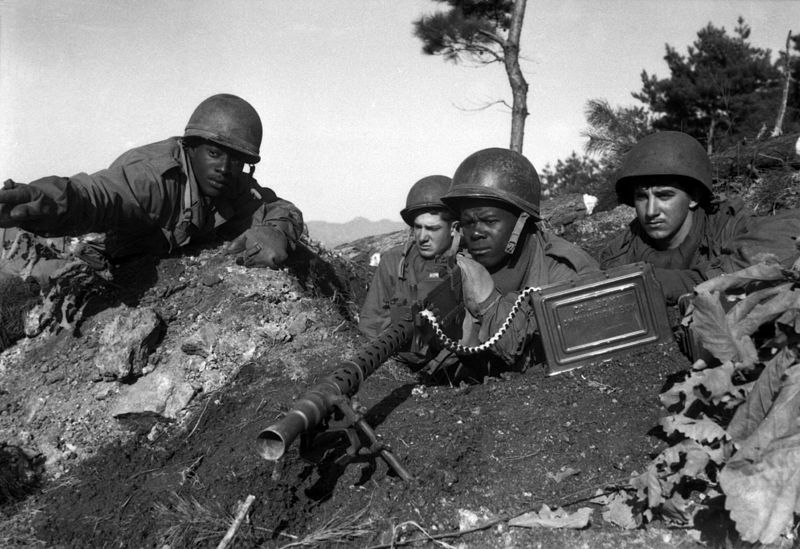

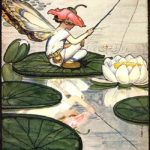
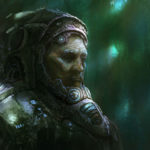
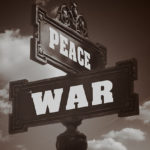
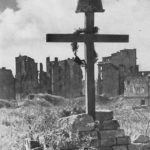



No mention of Starship Troopers? That’s more of an actual military engagement than Avatar with, as you said, the conflicted Good vs. the expendable Evil.
Kaleb, I’m not familiar with Starship Troopers. Is that a movie? a book? By what author?
Avatar certainly wasn’t a classic war picture. More like an assault, with US Revolution tactics in response.
Becky
Never heard of Starship Troopers? The great classic by Robert Heinlein? (It’s a movie too, but it wasn’t accurate.)
Guerrilla tactics, yes., also similar to what’s been used in Vietnam, Afghanistan, Iraq, and pretty much every insurgency involving a group of fighters fighting against a government with more money and resources.
It was also a CGI animated cartoon in the early 2000’s. It’s now on Hulu, if you care to watch it
Warriors serving the dark side can’t hit the broad side of a barn. 🙂
You make an interesting observation about moral welfare of good and evil armies: the dark forces are rarely redeemed while the heroes have the ability–and often inclination–to fall. My guess is that stories are more focused on the choices of the protagonists, or the actions they avoid based on the betrayal of a friend, or the consequences of falling rather than any doubts Clone 2683 might have about the righteousness of his Emperor’s commands. 🙂 However, I can think of one dark-force servant who was redeemed: Christopher Ens from Burning Light. He serves his master (though not unconditionally), but at the end, he acknowledges his need for mercy.
Moving from dark forces to the hero’s armies, here’s something that fantasy writers might find interesting: the just war theory. According to the theory, a war is just if there is a good reason to go to war, and if it is a very last resort: if all political negotiations have failed. Just thought I’d throw that out there.
I think that the multiple wars in fantasy–and reality–mirror the spiritual war that will last until Christ returns.
Great post, Becky!
Blessings,
Literaturelady
Great comment, LitLady. I agree that the most likely reason those in the armies of evil are nameless and faceless is because the stories are being told from the point of view of someone on the good side. A notable exception to this is Daughter of Light by Morgan Busse. One of her POV characters is a leader on the side that appears to be wrong. I’ll be interested to see where she takes this.
And yes, I think the fact that physical war can mirror spiritual war affects not only the outcome but the way the characters pursue their agenda.
I think most of the stories I’ve read, the wars are just from the point of view of the good guys. I wonder if they should ever wrestle with this or be faced with an illegal war or one for self-aggrandizement. Those seem reserved for the evil side (I mean, evil characters do evil thing! 😉 )
Thanks for adding to this discussion!
Becky
I think a lot of fantasy writers begin with the premise of a just war, even if it’s never expectantly stated. One of the rare incidents I’ve seen of a dark-sider repeating comes from the Binding of Blade. The character had begin his descent into evil by murdering his best friend of a girl, and ended up betraying his city in hope she’d be spared from the carnage. But by that point, he was under no illusions about what he had done, and in the end, he did hope for forgiveness, which was granted.
That‘s interesting, Galadriel–a character bringing on a war by his sinful action. Wow! that would be guilt inducing, wouldn’t it.
I only read the first in Mr. Graham’s series. I often wondered what happened next.
Becky
Good analysis, Ma’am.
Two factors that affect just how war is presented are the subgenre of fantasy to which the story belongs, and the experiences and/or research the author puts into the topic.
On the first part, a straight heroic fantasy like John Carter or heroic/low fantasy like the Ranger’s Apprentice will have far more even odds. There is less (if any) mystical, supernatural, or even Divine interference as in high fantasy. In high fantasy, the long odds are there partly because the protagonists aren’t supposed to be able to win without some sort of outside help or circumstance.
On the part of experience or research, you have veterans like Tolkien or Robert Jordan who do a pretty good job on describing warfare, and guys like Brandon Sanderson who do the research and thus present a pretty good picture of how warfare works.
Then you have those folks who don’t try at all. One clear example is the filmmakers of the LOTR movies. In the books, there is actual strategy employed at times, while in the movies, it looks like a bunch of people on both sides who wouldn’t know what a tactic was if it bit them upside the rear.
I tend to think that what distinguishes a good treatment of warfare and war-fighting, is how the work examines the psychological and spiritual cost of warfare, and also how quickly it shatters the illusions of war being “cool” or somehow “manly”. It is horrible. Again, LOTR showed this in the books, but the filmmakers failed to show this beyond a few scenes lasting a few seconds each. In the struggles that Vin and Elend have in Mistborn, Sanderson addresses it. So does Terry Brooks via Flick and Shea in Sword of Shannara, Will in Elfstones and Brin and Jair in Wishsong of Shannara. For that matter, the issue of the consequences of war is addressed somewhat in the works of Spec Faith contributors Donita K. Paul and Morgan Busse.
I’m curious about examples. How would you have improved upon, say, the melee in the Fields of Pelennor in The Return of the King?
Exactly, the charge of the Rohirrim (hope is spelled that right) was very sound and the way the horsemen wove their way around the oliphants was sound too, if you notice, Eowyn hamstrung one. One of the ways the bad guys try to get ahead is by fighting dirty, examples include the Mouth of Sauron pulling out Frodo’s mail shirt out and implying that he had been killed. Other tricks include kidnapping the hero’s girlfriend/wife/children or superior magic or weapons (see Hitler). On the other side the heroes do things straight up, like finding a way to get rid of the superior magic or weapons, like in the Black Cauldron when the Prince throws himself into the cauldron to destroy it. The heroes never resort to dirty tricks to win and are viewed by the villains as weak for it, see just about everything associated with Superman.
Timothy, great observations. No doubt a dystopian fantasy would portray war in a completely different way from a medieval mythic retelling or an epic fantasy. And of course science fiction would be on a whole different page.
I agree that experience of the writer, or research, shows through, as it should. Those who put in time on the battlefield know things the rest of us do not.
Also I agree about the emotional/psychological effects. One of the things that bugs me in books is when a character experiences a great trauma and then moves on as if nothing has changed. Your comments make me wish I had you as a beta reader to vet the reactions of my character when he first experiences battle.
Becky
In general, I would say to NOT just throw yourselves forward in one long zerg rush. Okay, in the books, there is the scene where the Rohirrim is described as slowly and methodically taking out the orcs holding merry and pippin prisoner. Partly for time constraints much of that was left out, but the film shows it largely as the Rohirrim swooping in and quickly killing everyone.
In the Gondor battle, Denethor’s (and after he goes ax-crazy/suicidal), Gandalf’s tactics and commands were discussed. There were more than words of encouragement shouted in the book. In the book, there was some plan discussed or put forth as to fighting the enemy. This distinction between book and film is less so in regards to the bad guys, because Sauron and their fellow-orcs didn’t care much if many of their number died.
In the movies, the main tactic was “charge!”. Now, a funny story related to this. I have read that early on they were using a computer program that WETA developed with the folks at ILM (Lucasfilm), to simulate large numbers of combatants on both sides. Apparently they did their job too well, as the computer would have the good guys retreat instead of fighting in the background of the main characters. The computer thought the good guys were toast, so had the good guys run away. Needless to say, they had to reprogram the computer to just have redo footage of guys fighting, and not be quite as complicated in how it portrayed the war.
Rebecca, Ma’am, I’m happy to do any beta reading any time. 🙂 That sounds neat.
I would say that the best example I have literally EVER read of a character dealing with the emotional impacts of war are (fittingly enough as the audience surrogates) the Hobbits in LOTR. Especially Sam looking mournfully on the dead Haradrim soldier, wondering if he was actually all that evil, or if he HAD to fight there. That scene was one of the most poignant in the whole book for me.
I’m not usually a fan of war in fantasy or science fiction, as it’s often done very poorly. One thing is that no intelligent side ever thinks of itself as being evil, but novels do this all the time. Or they refuse to humanize the other side and instead make it a race of subhuman things that it appears it’s almost a duty to kill. Usually there’s a lot of bad politics along with it-Heinlein’s Starship Troopers is a particularly heinous example of this, as his views on suffrage only for soldiers would lead to a military elite dominating society.
I’d recommend the Forever War by Joe Haldeman just because it’s an antiwar military sf book, and it makes a good counterpoint to Starship Troopers. The first Cobra book by Tim Zahn is also decent because unlike others, he manages to be balanced about war. Cobra soldiers deal with battle-related problems leading to the shortening of their life after service is over, suffer mistrust (possibly warranted) while trying to reintegrate into civilian life, and even the dilemma of how soldiers abandoned by their command should act.
Sir, Zahn is great at that sort of stuff. In the Star Wars novels he wrote, he solves the quandary of why so many folks (aside from the clones and conscripts who had no choice) would even want to volunteer and join the Imperial Navy. Because not all of them are evil. Some truly believe in their cause. They are wrongheaded, to be sure, but not evil.
I think the reason that their are “all-evil” races in fantasy is because often it’s the equivalent of the Devil or other demonic type of baddie who is creating them for this purpose, like Morgoth and later Sauron in LOTR, the Dark One creating Trollocks in The Wheel of Time, or the Lord Ruler and Ruin using hemalurgy in The Original Mistborn Trilogy.